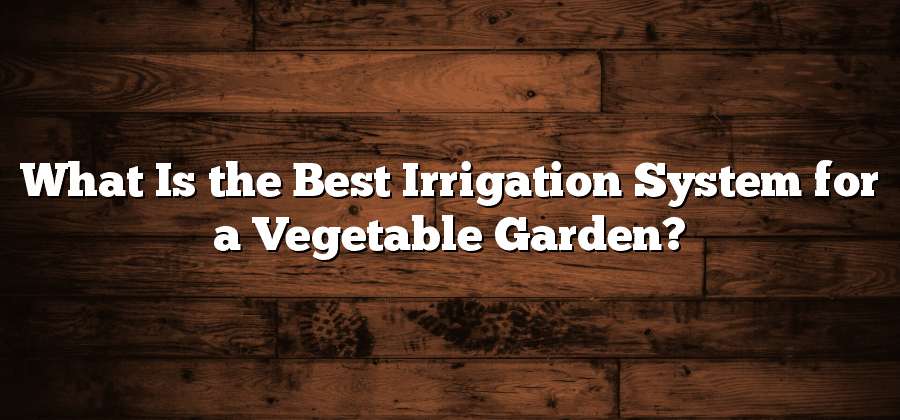Understanding the Importance of Irrigation in Vegetable Gardens
Irrigation plays a crucial role in the success of vegetable gardens. This is because vegetables require a consistent and adequate supply of water to thrive and produce healthy, abundant yields. Without proper irrigation, plants can become stressed, leading to stunted growth, reduced fruit production, and increased susceptibility to pests and diseases.
One of the main reasons why irrigation is important in vegetable gardens is that it helps to maintain optimal soil moisture levels. Vegetables have specific water requirements at different stages of growth, and irrigation allows gardeners to provide just the right amount of water when needed. Additionally, irrigation can help to prevent water stress during periods of drought or hot weather, ensuring that plants can access water whenever they need it. Ultimately, a well-designed irrigation system can promote healthy root development, enhance nutrient uptake, and contribute to the overall health and productivity of vegetable gardens.
Factors to Consider When Choosing an Irrigation System
When it comes to choosing an irrigation system for your vegetable garden, there are a few important factors that you should consider. One of the first things to think about is the size of your garden. If you have a small, compact garden, a simple soaker hose system may be sufficient. However, if you have a larger garden with multiple beds, you may need to invest in a more advanced system such as a drip irrigation or sprinkler system.
Another factor to consider is the water source available to you. If you have access to a reliable and consistent water supply, you have more flexibility in choosing an irrigation system. However, if water is limited or expensive, you may want to opt for a system that conserves water, such as drip irrigation. Additionally, you should also consider the type of plants you are growing in your vegetable garden. Some plants have specific water requirements, and certain irrigation systems may be better suited for them.
Drip Irrigation: Efficient Watering for Vegetable Gardens
One of the most efficient and effective methods of watering vegetable gardens is through the use of drip irrigation. This system delivers water directly to the roots of the plants, preventing evaporation and ensuring that each plant receives the exact amount of water it needs. Drip irrigation also helps to reduce weed growth and disease, as the water is not sprayed over the entire garden, only targeted at the plants themselves.
With a drip irrigation system, water is delivered slowly and evenly, minimizing runoff and waste. This is especially important in vegetable gardens, where water conservation is essential. The system can be set up to water the plants at regular intervals, ensuring that they receive a consistent and adequate supply of water throughout the growing season. Overall, drip irrigation offers a cost-effective and efficient solution for maintaining healthy and productive vegetable gardens.
Soaker Hoses: A Cost-Effective Solution for Vegetable Gardens
Soaker hoses are an excellent choice for vegetable gardeners who are looking for a cost-effective irrigation solution. These hoses are made of a porous material that allows water to slowly seep out along their entire length, delivering moisture directly to the soil. This method of irrigation is highly efficient, as it minimizes water runoff and evaporation, ensuring that every drop goes exactly where it is needed.
One of the key advantages of soaker hoses is their affordability. Compared to other irrigation systems, such as sprinklers or drip irrigation, soaker hoses are relatively inexpensive to purchase and install. Additionally, they are easy to set up and require minimal maintenance. Simply lay the hose along the base of your plants, cover it with a layer of mulch to prevent evaporation, and turn on the water. The slow and steady release of moisture will nourish the roots of your vegetables, promoting healthy growth and maximizing yield.
Sprinkler Systems: Pros and Cons for Vegetable Gardens
Sprinkler systems can be a convenient option for watering vegetable gardens. One advantage of using sprinklers is the ability to cover a large area of the garden with even water distribution. This can be especially beneficial for gardens that have a wide variety of vegetable crops with different watering needs. Sprinkler systems also allow for automated watering, which can save time and effort for gardeners. Additionally, sprinklers can provide a cooling effect on hot summer days, which can be beneficial for certain types of vegetables.
However, there are also some drawbacks to using sprinkler systems in vegetable gardens. One potential issue is that sprinklers may not provide water directly to the roots of the plants. Instead, water is sprayed over the entire area, including the leaves and stems of the plants. This can lead to increased risk of foliar diseases and fungal infections. Additionally, sprinklers can result in water loss due to evaporation, especially in hot and windy conditions. Watering overhead with sprinklers can also lead to uneven moisture distribution, as some areas may receive more water than others.






